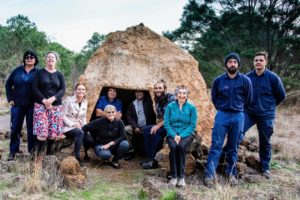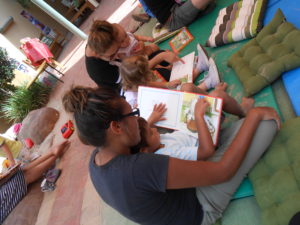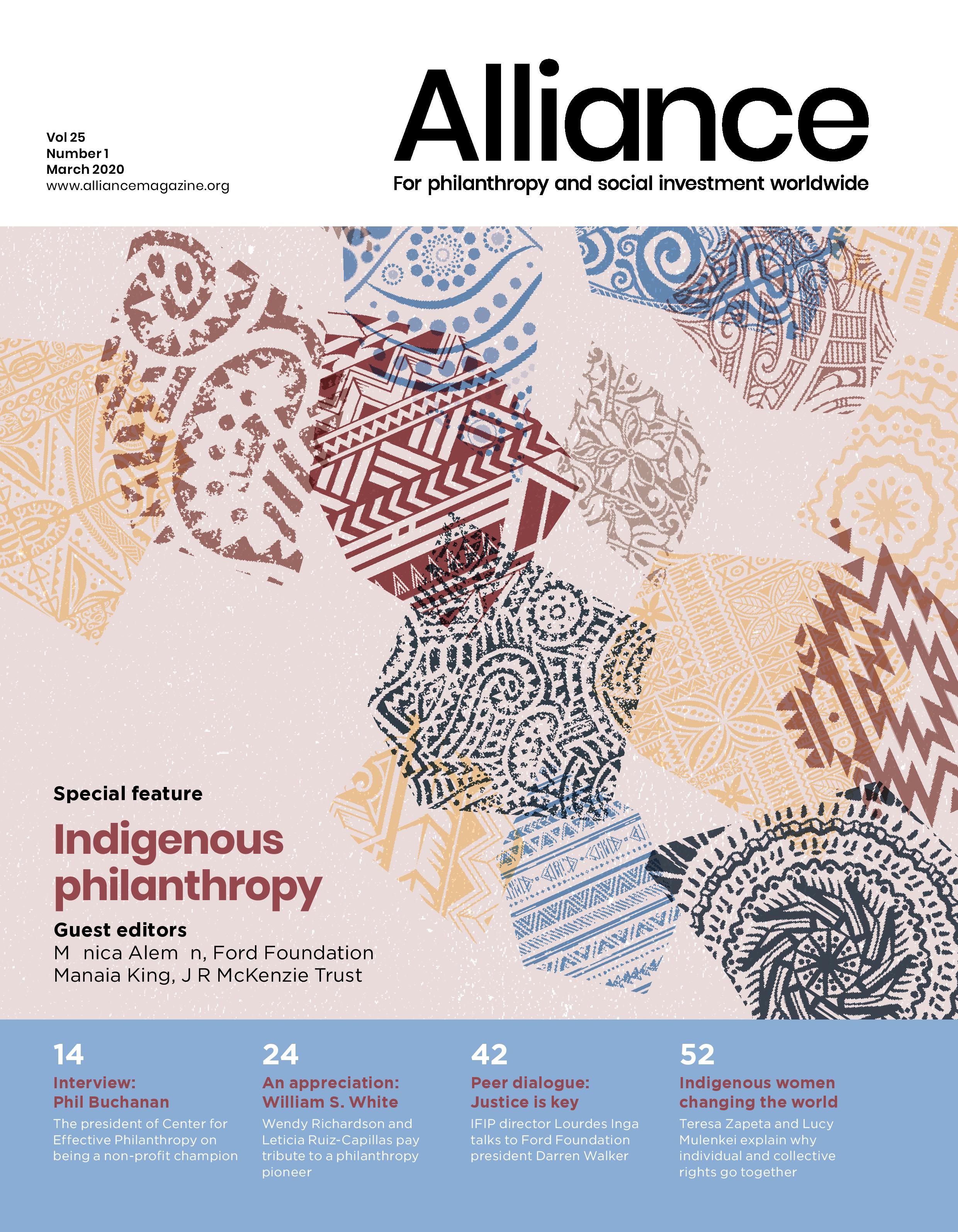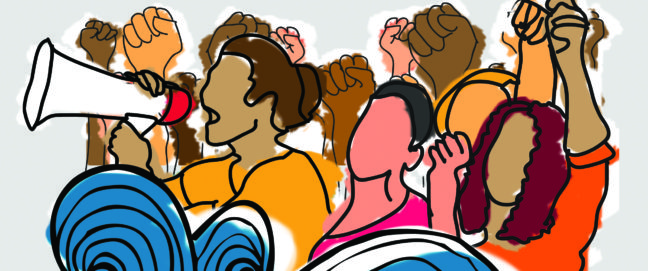Two Australian organisations are exploring more effective ways of funding Indigenous communities by drawing on the strengths of those communities
Respectful relationships and self-determination are fundamental to working meaningfully with Indigenous communities, but not all funders understand how to embrace this. The result is a missed opportunity both to realise the potential in communities and to address the consequences of colonisation.

On-country visit to Winda Mara Aboriginal Corporation.
Aboriginal and Torres Strait Islander people in Australia remain strong and resilient despite the devastating impact of over 200 years of colonisation. This has resulted in dislocation, dispossession, discrimination, inter-generational trauma and the catastrophic undermining of the social cohesion of Aboriginal families during the Australian government’s assimilation policy between 1910 and 1970, which resulted in the removal of a third of Indigenous children from their parents. Mainstream welfare, health and education systems in Australia have continued to fail Indigenous communities, with Indigenous children massively over-represented in foster care and juvenile detention. Furthermore, Indigenous Australians can expect to live ten years less than their non-Indigenous counterparts.
From its founding in 2009, CAGES has been committed to funding community-led initiatives building on assets of culture and country.
However, solutions to the disadvantage created by this systemic failure are found in the strength and knowledge of the Aboriginal communities themselves.
Giving back power to the communities
To realise the potential of this strength and knowledge, power and decision-making must be handed back to communities. In 2005, five Aboriginal women and one non-Aboriginal woman founded Woor-Dungin in response to the clear need for better understanding and genuine partnerships between philanthropy and Aboriginal Community Controlled Organisations (ACCOs). Woor-Dungin means ‘share’ in the language of the Gunnai people of south-eastern Victoria and sharing is the philosophy underpinning the organisation’s approach.
‘The community tells us what keeps parents and kids engaged and feeling safe. That’s why it works.’
Woor-Dungin’s Aboriginal partnership programme has been successful in increasing philanthropic support for ACCOs, but just as importantly, there has also been an increased level of respectful engagement from funders. Without trusted and respectful partnerships, it is difficult to deliver the common goal of achieving real social impact for Aboriginal communities. A crucial ingredient is self-determination.
‘Regaining self-determination has been a major issue for Aboriginal people ever since colonisation took it away. It gives us the choice to decide our social, cultural and economic needs instead of being told what is best for us,’ says Sherree Chaudhry, a Gunditjmara woman and co-chair of Woor-Dungin. ‘Self-determination enables us to develop and strengthen our culture, our lives, our communities.’
Reversing customary thinking
Self-determination is also core to CAGES Foundation’s philanthropic strategy. From its founding in 2009, CAGES has been committed to funding community-led initiatives building on assets of culture and country. What does this mean in practice? It means genuinely redressing the power imbalance and allowing communities to define what success looks like for themselves.
Some funders view funding community-led initiatives as high-risk. We deem it high-risk not to.
CAGES’ focus is to ensure every Indigenous child in Australia has the opportunity to reach their full potential. In 2012, CAGES built a relationship with Maari Ma Aboriginal Health Service in Broken Hill, New South Wales, which had designed with the community a locally-led early childhood strategy. Cathy Dyer, Maari Ma’s executive manager explains: ‘The community tells us what keeps parents and kids engaged and feeling safe. That’s why it works.’

Maari Ma playgroup.
CAGES understood Maari Ma was best positioned to lead the strategy and that to help it to do so, along with funding, the foundation also needed to provide agency so that Maari Ma could get on with business. This initiative has been funded for over seven years, with successful and sustainable outcomes.
Historically, funders have looked to mainstream non-Indigenous NGOs to deliver services like those within Maari Ma’s strategy. CAGES Foundation executive director, Gemma Salteri, explains why – and why CAGES turns that received wisdom on its head: ‘Some funders view funding community-led initiatives as high-risk,’ she says. ‘We deem it high-risk not to.’
CAGES Foundation has also initiated processes whereby Aboriginal voices are heard in strategy development and the boardroom. Together with engagement principles based on trust and respect, CAGES has redressed the power imbalance often innate within a funding relationship.
Working together to spread the message
CAGES and Woor-Dungin met in 2017 through philanthropic circles and discovered their common interest in the importance of self-determination. Since then, together and separately they have worked to spread their message on national and international platforms. In 2018, CAGES, Woor-Dungin and Koondee Woonga-gat Toorrong (the first Aboriginal-led fund in the state of Victoria) shared examples of positive outcomes generated from effective engagement between philanthropy and Aboriginal people at the International Funders of Indigenous People’s Conference in the US. At the same event the previous year in New Zealand, Woor-Dungin talked about its work on a philanthropy-supported, Aboriginal-led project to advocate for the introduction of a spent convictions scheme in Victoria to prohibit discrimination on the basis of an irrelevant criminal record. Also, in August 2018, Woor-Dungin brought philanthropic representatives together with ACCOs at a unique on-country gathering (a gathering on Indigenous land hosted by the traditional custodians) in an effort to forge greater trust and understanding between philanthropy and Aboriginal communities. While there is still a way to go, momentum is building in the philanthropic sector to commence a genuine dialogue with Aboriginal people.
The message that self-determined funding equals greater social impact is starting to cut through.
Rachel Kerry is executive officer of CAGES Foundation.
Email rkerry@cagesfoundation.org
Anne Jenkins (Kamilaroi from north-western New South Wales) is co-founder and vice-chair of Woor-Dungin.
Email manager@hicsa.org.au






Comments (0)